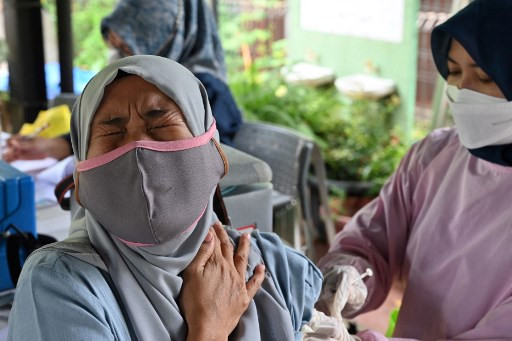Popular Reads
Top Results
Can't find what you're looking for?
View all search resultsPopular Reads
Top Results
Can't find what you're looking for?
View all search resultsCOVID antibodies now almost universal
Change text size
Gift Premium Articles
to Anyone
A
lmost all Indonesians have developed antibodies against COVID-19, according to the latest serosurvey conducted by the Health Ministry and the School of Public Health at the University of Indonesia in July.
Researchers examined blood samples from 20,501 people in 100 cities across the archipelago and found that around 98.5 percent of them had antibodies against the virus, due to vaccination or past infections.
The figure is almost 10 percentage points higher than the 87.8 percent recorded in a previous survey in December which involved the same respondents.
One of the researchers, Muhammad N. Farid, said the average antibody titer found in the respondents also increased fourfold compared with the December blood survey, from 444 units per milliliter to 2,097 units.
"This is due to the fact that there's an increase in people who’ve been vaccinated and who contracted COVID-19 in the past six months," Farid said in a press conference on Thursday.
He explained that in December of last year, roughly 30 percent of Indonesia's targeted 208 million population had not received COVID-19 vaccines, while last month only some 18 percent had not been inoculated.
The proportion of people who have received booster shots has also significantly increased as well, from 0.5 percent in December to 22.5 percent in July.
As of Friday, more than 202 million Indonesians had received the first dose of COVID-19 vaccines, some 170.4 million had been jabbed with a second dose and around 58.2 had received a third shot.
Epidemiologist Pandu Riono, who was also involved in the study, said that the result of the serosurvey showed the effectiveness of a third COVID-19 vaccine in increasing protection against the coronavirus.
Pandu said the highest increase in antibody titer was observed among respondents who had received a booster dose, with an average of 4,496 units per milliliter. Meanwhile respondents between 1 and 5 years old who have not yet been eligible for COVID-19 vaccines have an average antibody titer of 1,047 units per milliliter.
"This means that vaccination is much more effective in raising one's antibody levels compared with natural infections," he added.
Increasing third dose
Pandu urged the public to get the third shots as soon as possible, as although a high antibody titer could not protect someone from coronavirus infections it could help lower the risk of developing severe symptoms and death among COVID-19 patients.
This, he said, was proven during the Omicron variant-fueled wave that struck the country in January and February.
During the peak of the third wave, cases amounted to 64,700 a day but the highest daily death toll recorded during the surge of infections stood at 401. Hospitalizations also remained relatively stable at around 33 percent.
This was in contrast with the second wave in July of last year, with daily cases peaking at 56,000 and the peak of daily fatalities reaching 2,048. Hospitals also struggled to accommodate patients, with bed occupancy rates of around 80 percent.
The government has been trying to bolster third dose uptake among the public amid dwindling vaccination demand.
Last month, the government made booster shots mandatory for those visiting public facilities, including offices, parks, malls, restaurants and cafes, and for attendees of large crowd-pulling events.
Indonesia’s monthly vaccine rollout has been decreasing significantly since March of this year, with the government attributing the slowdown to increasing vaccine hesitancy among the public due to the improving COVID-19 situation.
The government managed to increase its vaccine rollout to around 7.7 million doses after the mandatory booster regulation was in place, however, average daily vaccinations still hover at around 250,000 per day, much lower than the around 1 million shots administered per day achieved earlier this year.
Vigilance
Epidemiologist Dicky Budiman of Griffith University Australia said that the result of the latest serosurvey should not lead to a lowering of the guard against COVID-19, since antibodies against the coronavirus wanes over time.
"Studies have shown that protection against COVID-19 wanes over time; in the elderly, antibody titers usually decline after three-four months. This means that we should not lower our guard against the virus," he said on Thursday.
Dicky explained that it was still crucial for the vulnerable groups to get a fourth COVID-19 dose, especially considering the new COVID-19 variants were better at evading immune response from vaccines or previous infection.










